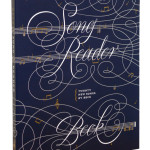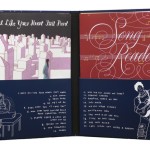Before a text can mean anything or a song can be interpreted, it has to be written. But do authors and composers influence the interpretation of their work and if so, how?
Michel Foucault writes "there was a time when the texts […] were accepted, put into circulation, and valorized without any question about the identity of their author."1 As the authors were unknown to the readers, they couldn't possibly know what the author's intentions might have been when the text was written. In the Song Reader preface Beck says the same about music: at the beginning of the twentieth century professional songwriters, whose names no one bothered to remember, composed songs to be played at home by millions and "the music felt like it could belong to almost anybody." In contrast today, a pop song has much more meaning attached to it and can't just speak for itself. It's not "just the document of a performance," but "an extension of a popular personality’s image within a current sound."2 Foucault sees the same development in writing. It became common to place the author in a position above the crowd of average people or as Lars Iyer puts it in his memorable literary manifesto Nude in your hot tub, facing the abyss: "Writers were like gods."3 Only the author had exclusive access to a world of significations, language and genius, only the author could give meaning to a text. As soon as the author spoke, meaning began "to proliferate indefinitely"4 to say it with Foucault.
Also, knowing who the author is can limit readers, as we might read and interpret the text in the way we presume the author intended or, alternatively, won't read the work at all, because it's written by someone we don't like. Again, who has not experienced the same in the way we choose music? We listen to the new Bowie songs, because it is Bowie, but we'd never buy the album of the latest American Idol or The X-Factor winner (or just the opposite?). The way we think about a particular work and how we interpret it is connected to our opinion of its creator.
So, returning to Beck’s Song Reader, how much influence does Beck have on the interpretation of his songs by only releasing sheet music?
My family and I (none of us professional musicians, I'm afraid) tried to play Beck's song Old Shanghai. After playing the first notes, we realized we were unable to just interpret the song from sight. We certainly had to practice before it sounded somewhat like a song. We all thought that listening to an original version by Beck, which could have shown us how it was meant to be played, would have made it much easier for us to read and interpret the notes. But this was not what Beck had in mind. He thinks his intentions are not important and said in an interview with The Guardian that he wants "to hear how far away they are from the original way they were written" and "what people do with them."5 Any interpretation is as good as that which Beck had in mind when he wrote it.
As far as the influence of the author or composer on the interpretation of their work I'd say: an author's name and intentions, if they are known to us, might influence the way we interpret the work and we've probably all chosen or excluded texts because of our expectations regarding a certain author. But when the creators of a work or their intentions are not known, as is the case with Beck, we are forced to come up with our own interpretation (a much harder process for some).
But if we don't know what the author's intentions were, do we find the key to its interpretation in the work itself? And if so, does this then mean, there's only one way of interpreting a work?
The New Critics think that to interpret a text nothing else but the text is needed, as the meaning of the text can just be picked up from the text itself. But if we look at different translations of one single text we'll probably find variations, as translators often disagree. Sometimes they even disagree with their own earlier translations as Russian-to-German translator Swetlana Geier explains about her work on Dostoevsky: "[...] the text moves. […] suddenly something is there, that one has never noticed before. [...] Even if one has translated it—I have translated it twice now, one cannot exhaust it and that is probably a sign of the most superb quality."6
In the same way, Beck couldn't see it more differently than the New Critics: "Don't feel beholden to what's notated. Use any instrument you want to. Change the chords; rephrase the melodies. Keep only the lyrics, if desired. Play it fast or slow, swung or straight. Take a song and make it an instrumental or an a cappella."7
So if the author and the work itself only have limited influences on our interpretation of a work, where then does the interpretation come from?
Reader-Response Critics like Wolfgang Iser think that the main factor in interpretation is the reader, who should have to work to be able to interpret the text. Giving the reader the entire story would only result in boredom. The pleasure in reading comes from an active and creative reader.8
Just as a good book leaves room for the reader’s interpretation by not explaining everything, Beck encourages us to be more creative by not giving us an original recording. If we take a look at the different versions that are available online on YouTube we can see that what Beck encouraged did happen: Dave and Ted offer us a classic jazzy piano version, while the Seattle Rock Orchestra changes all the noted instruments, and Stephin Merritt plays it on a toy piano. Some use only the lyrics and change everything else, others sing the song in French, and some don't sing at all.
Deconstructionists see reading as singular and general at the same time: singular, because reading is "yours and nobody else’s" but general as it doesn't require a particular reader to function but conforms to "patterns of meaning dictated by the text."9 Looking back at the Song Reader we can see those patterns as the musical notation, the melody or the text, i.e. all the features that help us recognize a certain song, although it comes in different versions. But just like a text, sheet music does not require a certain musician to function: it is general as everyone can play and interpret it. And at the same time, playing it is singular: no two interpretations of Beck’s songs will ever be the same. Every version is an original, there is no better version, no one is right or wrong.
As Faber and Faber, the UK publishers of the Song Reader, say: ‘Only you—the reader/musician—can bring Beck's Song Reader to life.’10 Without the musician there would be no interpretation of the song, just as without the reader the meaning of a text has no space to grow, or to put it in the words of Roland Barthes "a text’s unity lies not in its origin but in its destination."11
For the interpretation of a work the reader or the musician has to be involved creatively. Beck's Song Reader is showing us this process, as the songs gain the majority of their interpretation through what the individual musician does with them and we end up with countless versions of what Beck originally notated, with countless different interpretations.
- © jazzia / Fotolia.com & vectorgirl / Fotolia.com
[1] Michel Foucault, ‘What Is an Author?’ (1969), in Modern Criticism and Theory, ed. by David Lodge and Nigel Wood, 3rd edn (Harlow: Pearson Education Limited, 2008), pp. 281-93, hereafter Foucault.
[2] Beck Hansen, Song Reader, (London: Faber and Faber, 2012), pp. 1-2 of preface, hereafter Song Reader.
[3] Lars Iyer, Nude in your hot tub, facing the abyss (A literary manifesto after the end of Literature and Manifestos), The White Review (online), , [accessed 04 October 2012].
[4] Foucault, p. 292.
[5] Laura Barton, Beck on His Song Reader: "It was a Struggle for Me," Guardian (online), 26 November 2012, , [accessed 02 December 2012].
[6] Swetlana Geier, Die Frau mit den fünf Elefanten, dir. by Vadim Jendreyko (Mira Film GmbH/filmtank GmbH, 2009) [on DVD].
[7] Song Reader, p. 2 of preface.
[8] Wolfgang Iser, The Implied Reader: Patterns of Communication in Prose Fiction from Bunyan to Beckett (Baltimore: John Hopkins University Press, 1974), p. 275.
[9] Andrew Bennett and Nicholas Royle, An Introduction to Literature, Criticism and Theory, 4th edn (Harlow: Pearson Education Limited, 2009), p. 16, hereafter Bennett and Royle.
[10] Faber and Faber, Song Reader Beck Hansen [accessed 03 December 2012].
[11] Roland Barthes, ‘The Death of the Author' (1968), in Modern Criticism and Theory, ed. by David Lodge and Nigel Wood, 3rd edn (Harlow: Pearson Education Limited, 2008), p. 316







